Jonah House Food Pantry is the recipient of a $5000 grant to upgrade the pantry, allowing us to increase capacity and serve more neighbors in need.
We’ll provide more details as we proceed with the upgrade.
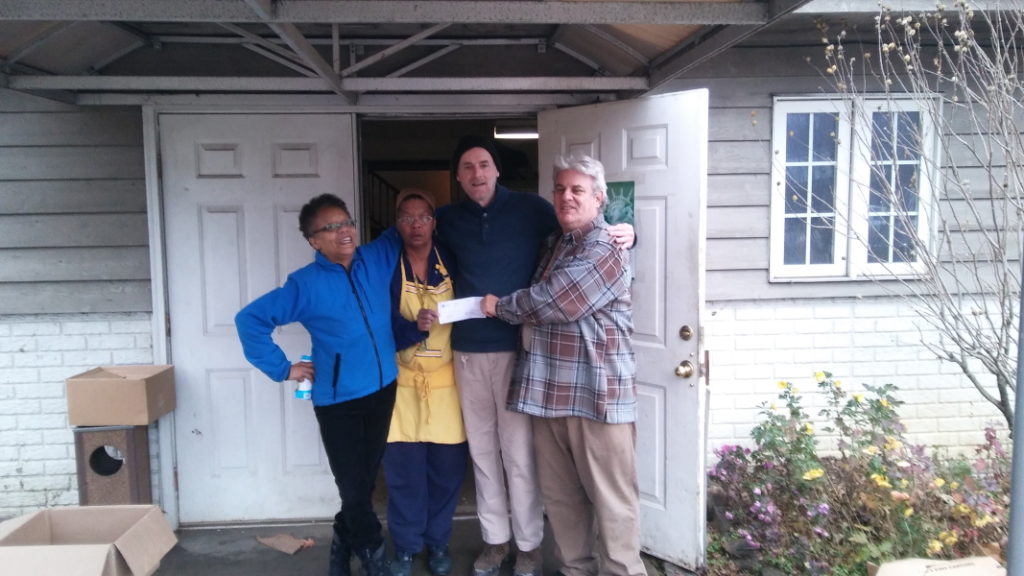

Jonah House Food Pantry is the recipient of a $5000 grant to upgrade the pantry, allowing us to increase capacity and serve more neighbors in need.
We’ll provide more details as we proceed with the upgrade.

Once again, a group from Xavier University graced us with a visit! They came for dinner on Wednesday, which was followed by a reflection session. Paul talked about the history of Jonah House and resistance to war and nuclear weapons, and the fact that community member and co-founder Liz McAlister remains in jail for her participation in the King’s Bay Plowshares action last April. Ausar and Naomi talked about the Jonah House Food Pantry and our partnership with Tubman House, in West Baltimore. And Joe talked about our work on the land in St. Peter’s Cemetery, including gardens, orchards, and forest, describing it as a work of mercy for the Earth.
The group returned on Thursday morning. Joe took them on a tour of the cemetery, after which Ausar took them to Tubman House, to visit some folks who live nearby and to lay mulch on the fruit trees at the urban garden that is attached to Tubman House.
They’ll be headed back to Cincinnati tomorrow. We look forward to their visit next year!
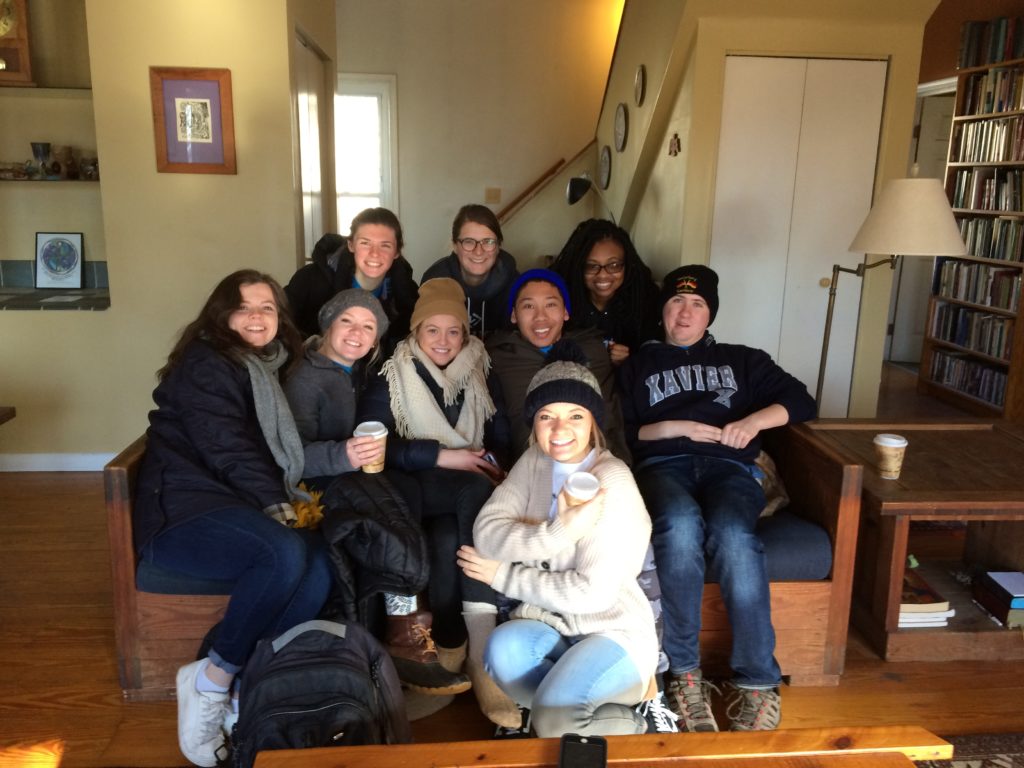
2017 was an eventful and adventurous year at Jonah House in Baltimore! During the winter months, we spent some time hibernating. We had to do a lot of splitting and stacking wood for our two wood burning stoves. Later in the winter we were occupied with planning the vegetable and herb gardens, then with planting seeds and cultivating new plants in our greenhouse.
We also had our regular food pantry ministry to keep us busy. Every Monday we went to the Maryland Food Bank to pick up discounted food and free fresh produce, and brought it home in our van to process in the pantry. Then on Tuesdays, from 9am to 12pm, we were in the pantry handing out food boxes to low-income friends in the neighborhood. Over the year, we gave out almost 4,500 boxes and half as many emergency bags. Unfortunately, we’re seeing more and more demand in West Baltimore, one of the more impoverished and underserved areas of Baltimore.
We had a few student groups visiting us over the winter and into the spring. A group from Xavier University in Cincinnati came for a day in January. They did some work outside at Jonah House, and at Tubman House, near the Gilmore Homes in West Baltimore, where they helped prepare raised garden beds that have been set up in abandoned lots. In the evening, we had a feast and did some reflection on the work of peace and justice in Baltimore, and the rest of the world. This one day was inspiring for one of the Xavier Students in particular: Josh Menke agreed to come back in the summer as an intern (he ended up staying with us for two months). Later, in early March, a group from Loyola University Chicago came to visit for a week, as part of Loyola’s extensive alternative spring break immersion program. Again, they worked at Jonah House and Tubman House. During the week, we broke bread and reflected on the four roots of Jonah House: community, spirituality, activism, and stewardship. In the evenings, we had fun playing “Fishbowl.” The group also had the opportunity to attend a couple of marches. The first was a Women’s Strike march in Baltimore, to commemorate International Women’s Day. The second was a march on the White House by Sioux water protectors from Standing Rock, North Dakota. Finally, a group from Loras College came for a short visit during Holy Week. The day after their visit, they drove to Washington DC, to take part in the Holy Week Faith and Resistance Retreat sponsored by Dorothy Day House. They witnessed at the Pentagon, and were there as Joe Byrne of Jonah House was arrested protesting for peace!
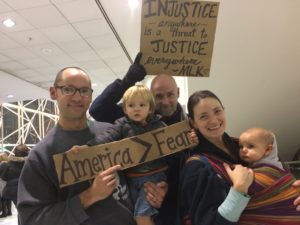
Tucker, Auggie, Joe, Emily, and Evie at BWI airport last January to protest President Trump’s immigration ban.
Jonah House continued to witness for peace and justice when the students went home. Tucker, Joe, and sometimes Emily did public “sits” in which we would go to City Hall Park, across from the War Memorial, in Baltimore, and do silent sitting meditation, while surrounded with signs that proclaimed our deep desire for peace and justice. During the year, Jonah House was also able to participate in events sponsored by the Atlantic Life Community, including two retreats and Faith and Resistance events during the Feast of the Holy Innocents, Holy Week, and the anniversaries of the nuclear bombings of Hiroshima and Nagasaki.
The summer, as usual, was a busy time at Jonah House. We had our fruit orchard to attend to, beginning with a “pruning party” in early spring. We also had our extensive garden to look after. Emily did much of the work there, with the help of many volunteers, including some of our Tuesday pantry folks. For a bag of produce, they would come Thursday mornings to plant, weed, and harvest. Meanwhile Tucker, with the help of his dad, built a chicken coop and yard. We now have fourteen hens laying upwards of a dozen eggs a day!
Throughout the summer we were able to bring in quite a bit of produce, preserving some of it, using some of it to feed the Jonah House community, the rest of it going into the food pantry boxes. We did pretty well with our fruit trees as well. The figs in particular were prolific, as were the grapes. We were able to harvest quite a few apples too, but the pear harvest was poor. This was due to the fact that the pears ripened a month early and were attacked by fruit-eating hornets. Last year we brought in five or six bushels; this year a half bushel. This brought home to us the very real threat posed by global warming and climate chaos.
Our community life was quite rich in 2017, including lively meals with the children, Auggie and Evie, often followed by quiet sitting meditation after the kids had been put to bed. But there were some changes in the composition of the community, with more to come in 2018. The three “emeritus” members of the community—Liz McAlister, Ardeth Platte, and Carol Gilbert—left us in 2017. Liz moved to New York City, while Ardeth and Carol went to Dorothy Day House in DC, where they plan to devote themselves to their ministry of “itinerant preaching” for peace. All three spent quite a bit of time at the United Nations in New York City educating and lobbying member nations about the Nuclea
r Weapon Abolition Treaty. This treaty was signed on July 7 by most of the world’s nations (but not, alas, the countries—like the United States—that have nuclear weapon arsenals), and will soon be ratified. The main NGO working for the treaty, ICANW (International Campaign to Abolish Nuclear Weapons), won the Nobel Peace Prize in 2017, thanks to the dedicated and selfless efforts of people all over the world, including Liz, Ardeth, and Carol.
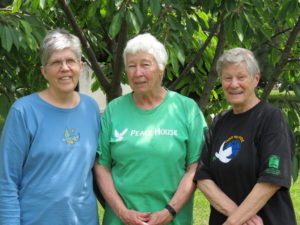
Meanwhile, after much discernment, Tucker and Emily decided to leave Jonah House. They and their kids will be moving out in May 2018, so that they can be closer to family in the Midwest, and Tucker can pursue an academic career. Like Liz, Ardeth, and Carol, they will be missed mightily! Joe remains to carry on the work of Jonah House and is excited about welcoming in two new members to the community. Ausur Amen and Ayo Rodan have been an extensive part of our community and work in west Baltimore over the past two years and are thrilled to be joining Joe in May to continue the work here at Jonah House. The community is still recruiting additional members so if you know anyone who would like to do the work of peace and justice in the context of intentional community, please contact Jonah House.
Finally, we are very grateful for all the volunteers who pitched in during 2017, and those who sent us donations to do our work. We couldn’t do it without you! As Martin Luther King Jr. said in his Christmas Sermon in 1967, “All life is interrelated. We are all caught in an inescapable network of mutuality, woven into a single garment of destiny. . . . We aren’t going to have peace on earth until we recognize this basic fact of the interrelated structure of all reality.” Thanks for joining us in our work and play! We hope and pray you will continue to do so in the years to come.
By Joe Byrne
During Holy Week, we had a very full and fulfilling one-day visit from Loras College students. Loras College has been sending a delegation for Holy Week for many years now. We’re so glad to have the tradition continue.
Here is the crew who helped Tucker remove leaves and trash from the south-east corner of the cemetery:
Meanwhile, Emily and a student collected wood chips for Mulch. Auggie helped too!
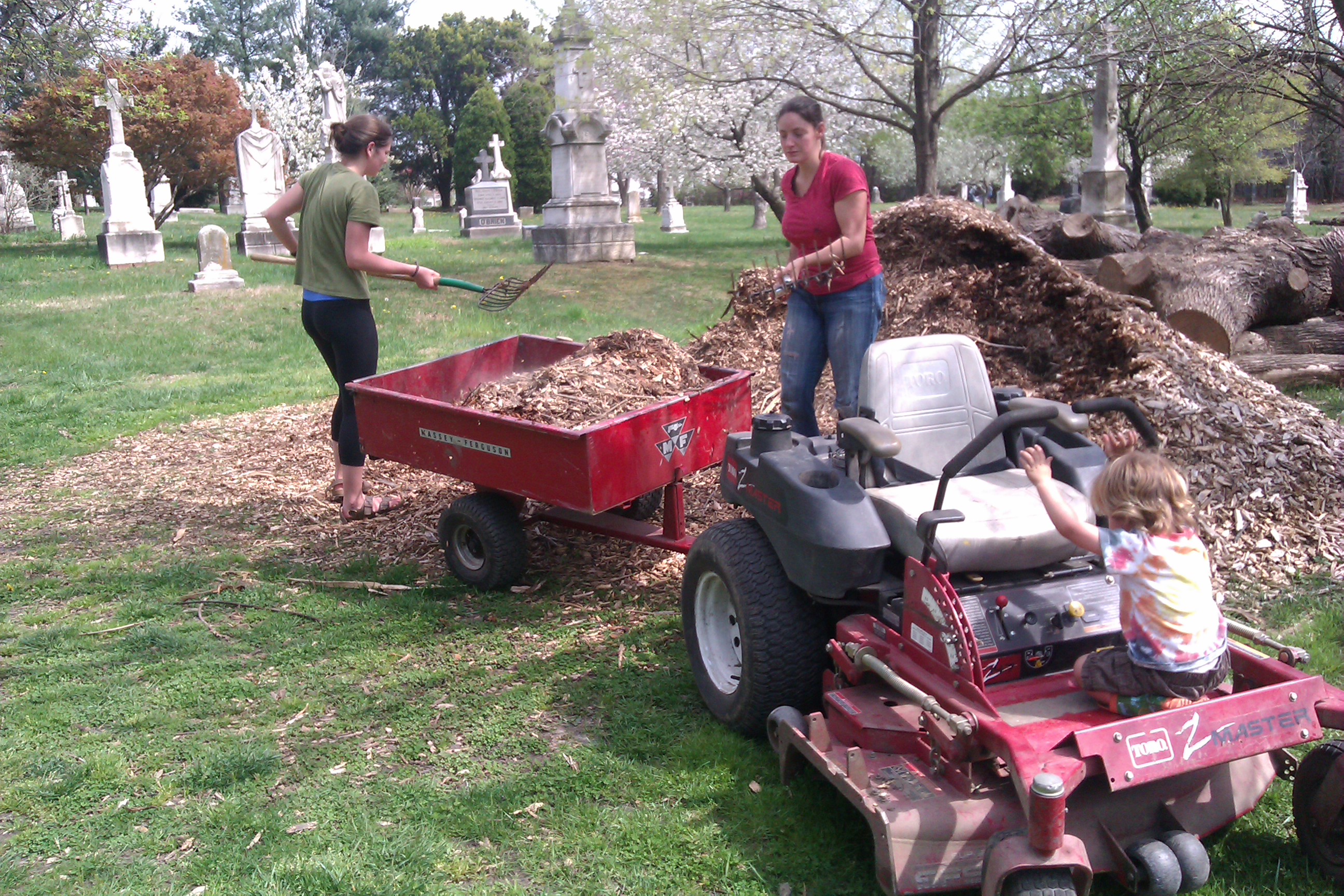 Here’s the crew helping Emily plow, plant, and mulch the garden:
Here’s the crew helping Emily plow, plant, and mulch the garden:
These lettuce and cooking greens survived the winter and have been replanted so they can flourish over the summer:
Pema in her favorite garden/doggy bed:
And here is the two person crew who helped Joe prepare the food boxes for next week’s food pantry day:
By Joe Byrne
We were recently graced with the visit of a contingent of seven folks from Loyola University Chicago, as part of their Alternative Break Immersion (ABI) experience.
The group participated in all the usual Jonah House activities, as well as a couple public witness demonstrations that occurred during their visit. On the first day, a Sunday, they participated in the Sunday liturgy with other members of the liturgy circle. Their orientation happened Sunday evening, and included a presentation by Joe on the Jonah House core value of nonviolence, the “ground” in which our four roots delve deep, and from which all the work of Jonah House grows.
The next day, while some were on house crew, cleaning the big house and preparing meals, others were working outside. Here is the “kindling crew,” namely Curtis, Kelsey, and Adimilola, who collected sticks from off the ground in the cemetery, broke them up into kindling sticks, and stored them in boxes.
In addition to our daily community tasks, Tucker, Emily, and Joe gave presentations on the Four Roots of Jonah House. Tucker presented on resistance (activism), Emily on community, Joe on resilience (stewardship). Here the students gaze out the glass doors during one of the presentations. They were otherwise very attentive!
On Wednesday, March 8, the whole community, including the Loyola student group, participated in a Women’s Strike march, to commemorate International Women’s Day. The march in Baltimore was one of many throughout the United States.
Here are Emily and Evie, along with our dear friend Lin Romano, chatting, while listening to speakers, waiting for the march to begin:
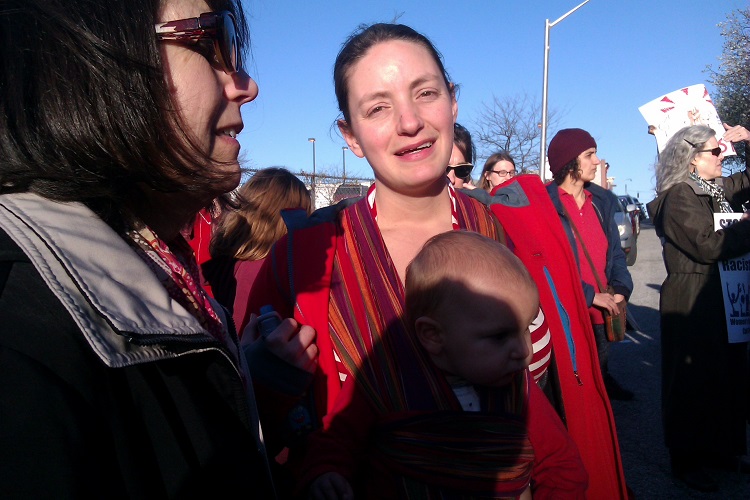 Here the march heads downtown:
Here the march heads downtown:
Here is Kelsey, with Tucker and Auggie right behind:
Here is Tucker and Auggie again, next to Sidney, with Emily and Matt in front:
One of the stopping points was the Women’s Prison in Baltimore. Some of the Loyola students were struck by the tragic irony of having a women’s prison across the street from a school. It’s quite possible that some of the mothers of the children who attend that school may be in that prison.
Here Adimilola, Sidney, and Emily do their best to support–with their fierce, gentle energy–the women in the prison:
Here is a shot of Tucker and Auggie in front of the woman’s prison:
On Thursday, the Loyola students were at Harriet Tubman House, helping with one of their new garden areas. Joe was in charge of the crew that put sheets over the raised beds (to keep the cats from pooping in them!):
Here is a shot of many of the raised beds covered. In the background are students helping dig holes for poles that are needed to create a grape arbor:
Eddie Conway (center), one of the founders of Tubman House, confers with Tucker and Azar, who is the chief “farmer” at Tubman House:
Here Curtis chats with one of the members of the Tubman House collective:
Here is the group at the end of our time at Tubman House:
You can see more about Tubman House at their Facebook page (Coalition of Friends). All the photos of the Loyola visit to Tubman House are courtesy of Tubman House.
On Friday, on their last full day, the Loyola group participated in two public witness demonstrations. The first was in Washington DC. It was a march on the White House by Sioux water protectors from Standing Rock, and their allies. The water protectors are nonviolently resisting the Dakota Access pipeline (DAPL), which is being built on their sacred lands and endangers their water supply.
Here Matt holds a sign that says “You Can’t Drink Oil”:
Here Tucker, in his Zen Buddhist priest robes, walks with Eric Martin, editor of a new book collection of the letters of Dan and Phil Berrigan:
Emily and the kids made the hour-long trip to Washington, DC, and part of the march, but Auggie and Evie reached their demonstration limit before the end of the march, and Emily took them back to Baltimore.
Here Ardeth and Carol march with Kathy Boylan of Dorothy Day Catholic Worker (sorry Carol for posting this pic):
We reach the White House:
This is one of the many sign/banners that caught my eye:
The students, who met up with another Loyola Chicago ABI group staying at Dorothy Day Catholic Worker, stayed for the rally that followed. But Tucker and Joe headed back to Baltimore.
Later in the day, some of the Loyola students participated in their second public witness of the day. This was our regular public sit at City Hall Park in Baltimore. Here are the sitters with a special DAPL-themed poster:
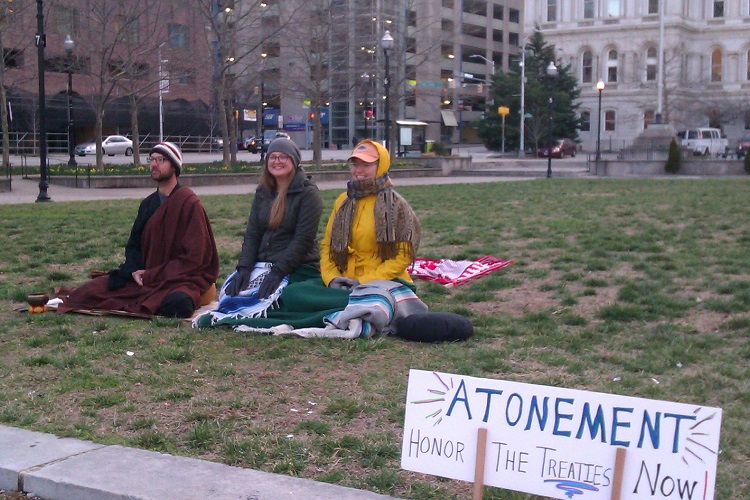 Here the bundled-up Tucker, Emily, and Kelsey beam peace from the park towards the war memorial across the street.
Here the bundled-up Tucker, Emily, and Kelsey beam peace from the park towards the war memorial across the street.
These pics show only part of the experience of the Loyola Chicago ABI, and don’t capture all the gifts the students brought to Jonah House (for instance, there are no pictures of “Fishbowl,” the game the group played five nights in a row during their stay). We miss them terribly and hope some or all of them will visit again soon (or perhaps stay for a couple months as interns).
By Joe Byrne
Recently I was charged by the community to learn about mushroom inoculation. This does NOT involve giving shots to mushrooms to keep them from getting the flu, but rather seeding logs so that they produce mushrooms (in this case, oyster mushrooms). The inoculation workshop was given by the Baltimore Orchard Project, which is part of Baltimore Civic Works, at Real Food Farm, at Clifton Park, in Baltimore.
The workshop was completely hands-on. The participants collectively inoculated the logs, then at the end of the workshop, each participant picked out a log to take home. The steps included drilling holes into logs (freshly cut logs from healthy, living trees–otherwise, other fungi and bacteria may prevent mushrooms from forming), pounding pegs covered with mushroom spawn into the logs, and sealing the holes with wax.
Here the wax crew works on sealing holes in the logs:
I was able to work on all the crews. In fact, for the log I picked out to take home I cycled through all three crews. That is, I drilled holes in a log, pounded the inoculated pegs into the holes, and then sealed up the holes with wax. Here is the lucky log:
Next, I have to put the log somewhere outside, in a moist shady area, and it should produce a couple crops of mushrooms this summer. And now that I know how to do it, I hope to inoculate other logs–though I don’t really want to cut down one of our healthy trees to do so. Maybe I can get a tree donation, like the huge tulip poplar a tree care company dropped off at St. Peter’s that we still need to cut up with chainsaws (subject of a future blog entry!).
Note: The following is a letter/email sent out in September by the emeritus members of Jonah House, who are Liz McAlister, Ardeth Platte, and Carol Gilbert. Liz has since moved to New York City (contact information below). She is dearly missed in Baltimore but continues her wonderful work for peace in the Big Apple.
September, 2016
Dear friends and family,
For the past five years, we, the elders at Jonah House, have been in the process of turning over the Jonah House Community and St. Peter’s Cemetery maintenance to the younger generation. As we continue this transition, we have begun, once again, to feel the freedom to re-enter more fully into the ministry of peacemaking.
The new core community at Jonah House – Emily Parr, Tucker Brown, and Joe Byrne – were attracted to our charism. They had participated in the life of Jonah House over the years, and responded to the call to come. They are forming community here! They are embracing this space with all the creativity that comes out of their lives and experience.
We find them respectful of the history and witness of Jonah House at the same time as they embrace the challenge to put their own stamp on it and to recruit new members. Check out the reactivated website – www.jonahhouse.org. We experience them and their commitment as strong, deeply rooted in the Spirit, and open to the participation of a wide circle of family and friends. Also, the children (Auggie and Evie) bring wonder and amazement! Our yearnings for new community are gratefully fulfilled in them and in their process. What a blessing!
As we transition we want you to know that we have closed the Jonah House account so checks may no longer be made out to it.
Also, we provide you with the most current contact information:
Emily, Tucker, and Joe:
Jonah House, 1301 Moreland Av, Baltimore MD 21216
Phone: 410-233-6238
email: engage@jonahhouse.org
Donations for programs should be made out to St. Peter’s Cemetery Restoration Fund.
Carol Gilbert, OP and Ardeth Platte, OP:
1303 Moreland Av, Baltimore MD 21216
Phone: 410-908-4635
email: disarmnow@verizon.net
Elizabeth McAlister:
Benincasa
133 W. 70th St, New York, NY 10023
Phone: 443-804-6938
e-mail: lizmcalister39@gmail.com
(After 43 years working to build the Jonah House vision, Liz feels the call and need to leave and to embrace whatever the Spirit is opening…)
It is a new moment, a new day and we give gratitude to God. We say “Presente” to all who lived and served here but have now left this life. We continue to celebrate their resurrection. We are profoundly grateful to the builders, work crews, residents, donors, caretakers, counselors, visitors, etc. who gave for us to be able to continue this St. Peter’s Cemetery oasis and our own peacemaking lives. We express deeper gratitude to the new community in the transformation being lived, as they carry Jonah House, the International Peace House/Community, into the future.
All of you remain in our hearts and prayers,
Liz, Carol, and Ardeth
I try to remember how I imagined Jonah House when Ben Warner first explained it to me one evening at Towson’s Urban Farm in the spring of 2015. I guess I saw images of my girlfriend’s catholic high school. I pictured a stone parish with a bell tower and overgrown headstones facing the street from behind wrought iron fencing. I wondered how large the garden was where sisters walked up and down rows of all manners of colorful produce that would go to the food pantry I had heard about. I originally imagined godliness and Christian purpose at the mantle of the work at Jonah House and I was dissuaded, feeling separated from the church. Ben explained, however, that these sisters are unlike any nuns he had ever met.
After meeting the community members and visiting the grounds, I was inspired. I felt obscurely that this was what I’ve wanted to be a part of. I’ve grown up in an area where bigotry is common and often acceptable. I came to Towson University in an effort to escape that climate and experience some genuine sense of diversity of culture, race, and wealth. To be close to Baltimore. Towson was an improvement, but still the campus was separated from and in many ways blind to the suffering of the areas around it. When I would drive into downtown Baltimore to see a play or visit a museum, I would suffer a sense of uselessness when we drove by the people stuck on street corners. I was not and am not hardened against cardboard signs and tin cans, held out for pocket change. Poverty is something I have only ever spectated. But here in Jonah House were people concerned with acting on it and engaging with people who suffer.
My father asked if shaving my head was a requirement for staying at Jonah House. I wasn’t sure how to explain it. I didn’t want to be bothered with hair, clothing styles, how I looked while I was in this place. I wanted to separate myself from materials. Of course, when we arrived Tucker and Joe, the only other men living in the House, did have their heads shaved. I made a point to assure my dad that I was not joining a cult.
My first few nights were more difficult than I expected. Everyone was tremendously welcoming and loving and I hardly knew how to accept it. Augustus wished me good night. Then Emily gave me home-made ice cream with strawberries from the garden, and we watched a movie together, as if I had been a part of the family for weeks. When I went to my room in the basement that night, there were five beds and no table, so I put my alarm clock on the floor. For perhaps the first time in my life I felt very far from home.
When we began the yard work, I expected to feel a greater sense of purpose. Tucker spoke to me about the value and process of work, and explained how important it was for Auggie and Evie to grow up watching their parents work so that they may live the way they do. There were times when weed-whacking seemed endless or picking rotten fruit felt pointless and I would start to believe I could never be strong or patient enough to live the way this community does. The purpose of my work came spinning back to me when Auggie and I ate strawberries that were still warm from the sun or when Ardeth listened to a funny story from one of the food pantry members as she got him greens from our garden. After sitting in the evenings, it became easier to look back and think of the successes and failures of the day. Lying in bed, I often thought about the presence of Ardeth, Carol, Liz, and the Jonah House community on Bentalou street as I listened to the distant pops of either fireworks or guns in the neighborhood.
I struggled most to prepare food for our community. I have very little experience and trying scared me. In my mind, food is so close to home, so basic and natural, that it is our connection to the community around us. We share food with the locals and we work on our small patch of Earth to provide for ourselves what we can. I once heard my uncle say, paraphrasing Alan Watts, “Godliness is not peeling potatoes and thinking about God. It’s just peeling potatoes.” Our work and our preparation of food are our communion with the earth. I didn’t want to burn our communion with the Earth. But Tucker, Joe, and especially Emily were extremely helpful and encouraging. They showed me efficient ways to harvest greens and simple tips to sautéing vegetables. They also all made a point to compliment my work.
In the second to last week of my time at Jonah House, it seemed the morning news had nothing to offer but violence. Alton Sterling, Philando Castile, the Dallas Police Officers. It was weighing heavily upon me, and Tucker made the suggestion we do something. To be closer to Baltimore, I thought. We made six signs, wishing for peace, the most powerful of which read:
Awaken from the Illusion of Separation
There in the grass, with the wind blowing our signs over and the sounds of the inner harbor’s bustle all around us, we sat. With the intention of peace makers and allies we sat. I felt strongest on that day. I felt I truly was a member of this place of peace. Before long, our sit was interrupted by marchers who surveyed our signs. They were wary at first, but then approached and hugged us. They asked us to join them, so Tucker, Auggie, and I walked down the street, joining the movement. Auggie was perplexed. He watched faces and clapped when the march ended.
As my stay was coming to a close, I was sad to leave this family, and especially Auggie. The sisters hugged me and reminded me that I am always welcome. Emily taught me to make pickles and one of the few things I took from the house were three jars of pickles and two of relish in the satchel Joe gave me. I did not know how to thank these people for making me a member of their community. How do I thank someone for love? I admit, however shamefully, that I was also eager to return to some of the comforts of my home. It is no small calling to choose a life of so little material value and there were times when I was frustrated and wearied. Jonah House gave me a taste of a life I will one day return to, whether it is on Bentalou street, in Garrett County, or off somewhere else in the world. A life where items have no possession, but are merely visiting me while they bring me joy. Where food is something I can raise from the Earth, not just something that comes in boxes with expiration dates. Where I value the work that I am doing outside of the transferrable wealth it may bring me. And a life where I live by and for a community that loves unconditionally.
It is difficult to be thrust back into the role of college student. I am busy from the moment I wake up, when I click off the same alarm clock with glowing green numbers, and yet the sense of purpose I felt at Jonah House is much harder to find here. So many people wedge past each other as we walk to classes, headphones in our ears. So many people are trying to be alone. Each day I am trying to be patient and practice loving strangers. It is often that at the end of the day I must step back, breathe, and respectfully remind myself to awaken; awaken.
“Justice is what love looks like in public.” – Cornel West
This summer, I was blessed to have the opportunity to serve the community of West Baltimore through Jonah House. I spent two days a week there: on Tuesdays, I served neighbors through the food pantry; on Thursdays, I served by assisting with outside work, cleaning the house, or sometimes just spending time with the men, women, and children who live at Jonah House. In addition to the physical help that I was able to provide to the community was the spiritual healing that I underwent during my short time with the community.
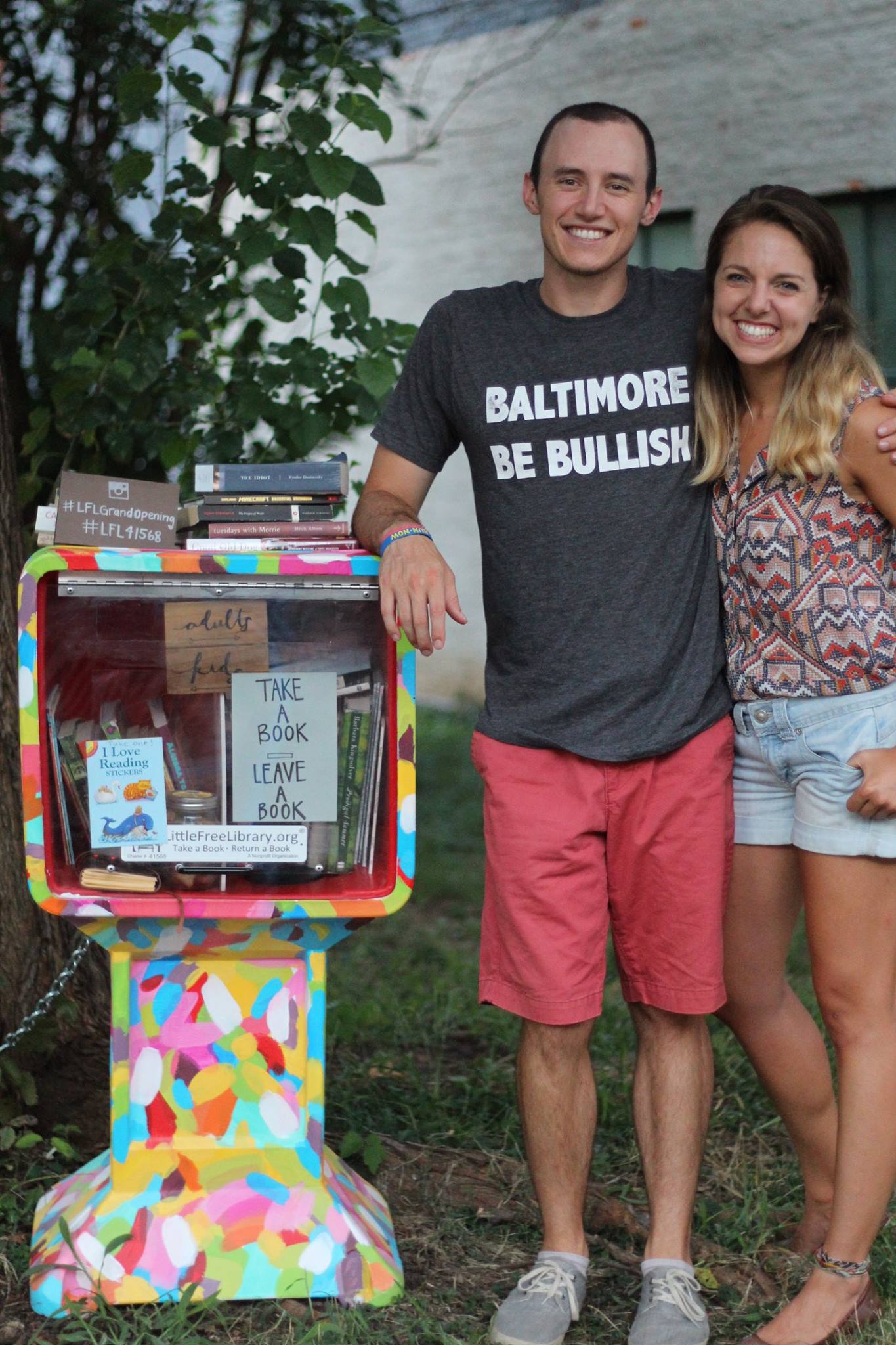 I first became aware of the Jonah House community a little over two years ago. I had moved to Baltimore in September 2013 to begin a year of service with Bon Secours Volunteer Ministry (BSVM), a small service organization that is part of AmeriCorps. I and four other men and women moved into an intentional community in the Union Square neighborhood of West Baltimore – living just two doors down from Brendan Walsh and Willa Bickham at Viva House – and served at Bon Secours Hospital. One aspect of the BSVM program was weekly reflections on Thursday mornings, and on one morning in the spring of 2014 Shannon, the director of BSVM, took us to Jonah House to meet the community. I remember being struck by the peace and serenity of the grounds, and how quickly I felt as if I had been transported out of West Baltimore. I couldn’t fathom how such a beautiful place was located in the heart of West Baltimore! We spoke with the couple who had been living there at the time, Ted and Amy, about the central tenets of the Jonah House community and their approach to radical love and living out the teachings of the Gospel. I was intrigued and inspired by this community and wanted to get more involved; however, I was soon swept up by the end of my year of service, finding a new job and place to live in Baltimore, and applying to medical schools.
I first became aware of the Jonah House community a little over two years ago. I had moved to Baltimore in September 2013 to begin a year of service with Bon Secours Volunteer Ministry (BSVM), a small service organization that is part of AmeriCorps. I and four other men and women moved into an intentional community in the Union Square neighborhood of West Baltimore – living just two doors down from Brendan Walsh and Willa Bickham at Viva House – and served at Bon Secours Hospital. One aspect of the BSVM program was weekly reflections on Thursday mornings, and on one morning in the spring of 2014 Shannon, the director of BSVM, took us to Jonah House to meet the community. I remember being struck by the peace and serenity of the grounds, and how quickly I felt as if I had been transported out of West Baltimore. I couldn’t fathom how such a beautiful place was located in the heart of West Baltimore! We spoke with the couple who had been living there at the time, Ted and Amy, about the central tenets of the Jonah House community and their approach to radical love and living out the teachings of the Gospel. I was intrigued and inspired by this community and wanted to get more involved; however, I was soon swept up by the end of my year of service, finding a new job and place to live in Baltimore, and applying to medical schools.
Jonah House found its way back into my life in early May 2016, shortly after the death of Daniel Berrigan. I was amazed by the outpouring of love and support from people of all walks of life after his death, and the more I read about him the more inspired I became by his teachings and his actions. I finished my first year of medical school at the University of Maryland in mid-May, and since I didn’t have any classes this summer I saw it as an opportunity to spend time at Jonah House, which was founded by Dan Berrigan’s brother and frequent co-defendant Philip, and his sister-in-law Liz McAlister, in 1973. I was welcomed into the community immediately, and saw the gifts that each member of the community – Liz, Ardeth, Carol, Joe, Emily, Tucker, Auggie, and Evie – contributed to the house.
I’m going to be honest and vulnerable here. As much as I want to live my life in radical solidarity with the poor and truly live out the teachings of Jesus, a) I’m scared and b) I’m not good at it. Take the Jonah House food pantry, for example. Every part of me wants to love unconditionally the neighbors of Jonah House who come each week to receive a box, knowing that these men and women are my brothers and sisters and that their suffering is also my suffering. And yet, every time someone asks for a second item or for an item that isn’t in that week’s box, there is a deep, nagging voice in my head that says, “Really? Can’t you just be grateful for what you’ve been given?” It’s awful, I know! And it’s hard for me to admit this.
But this is why I think that my time at Jonah House was so valuable this summer. When I witness Ardeth’s look of joy when a person who hasn’t been by in a while comes to get a box, I witness the joy of Jesus. Or when I see her feel empathy for someone who is going through a tough time in his or her life, I see the empathy that Jesus had for the poor he encountered. This unconditional love that the members of the Jonah House community exhibit each and every day has softened my heart, which is hardened by society on a daily basis.
I also have to admit that I was pretty anxious about my abundance of “free time” this summer that provided me with the opportunity to spend time at Jonah House. You see, most of my classmates at the University of Maryland spent their summers in the hospital, conducting research with physicians in hopes of getting published to further help their careers. In fact, the medical school requires all of its students to conduct a research project before graduating, telling its students that they make it mandatory because it will help all of us be more competitive when we apply to residency programs. I, too, was lined up to do a research project this summer in the Emergency Department at Bon Secours Hospital. Things never really came together, however, and in some ways I’m glad that they didn’t.
You see, the culture of medicine can be quite toxic. Here you are, surrounded by people who have succeeded in just about everything they have ever done their whole lives; their hard work and privilege has served them well. And then you inject paranoia into their lives by telling them that they won’t be successful in their careers unless they publish papers and get recognized for research (by the way, I’m not bashing research. It’s incredibly important to the furthering of our medical knowledge. It’s just not my thing!). So these students place themselves in the rat race, without even considering if it’s a race they really want to run.
In many ways, I think this culture is a microcosm of Western society at large. We’re told from an early age that there’s really only one legitimate path to success: go to college, then obtain a graduate degree, build a successful career, etc. Only YOU can create your own success, even if it’s at the expense of others. And my experience this summer at Jonah House just reminded me how false and harmful this narrative is. I witnessed the lives of men, women, and children who have found Christ’s love in the heart of West Baltimore and who work every day to spread that love to all who need it.
I vividly remember one conversation I had with Tucker this summer. We were talking about his work boots and how durable they were and how much he loved them. I said something along the lines of “Yeah, I bet you that they let you go out there and just conquer the world!” He paused for a few moments and replied, “No, not conquer. I don’t think that’s the right word. They allow me to experience the beauty of this world.” It was a beautiful example of how our interactions with this world and the environment are an integral aspect of our spirituality and faith.
Jonah House has reminded me that my definition of success doesn’t have to be defined or controlled by others. I don’t have to enter the rat race if I don’t want to; and believe me, I don’t! I simply strive to be an extension of Christ’s love to us. I am grateful to the Jonah House community for welcoming me this summer!
As I reflect on the six weeks over which I was blessed with the opportunity to live, work, and play at Jonah House the word “transition” comes to mind over and over again. When I first arrived at the house I had two weeks left in the job where I had been for the past two years and I was in the midst of ending the lease at an apartment where I had been for the same amount of time. I was filled with questions about myself and the future and was uncertain even of how the rest of the summer would pan out. I’ve always struggled with anxiety and times of transition, no matter how small, have always been a major trigger. Coming to Jonah House during this time, I was certainly anxious, but welcomed the opportunity to be consumed fully by community life. I suppose I had somewhat of a fantasy about what this would look like. I envisioned becoming so wrapped up in the day to day that I wouldn’t have time to dwell much on anxiety or transition. What I didn’t realize was that life in the community over the next six weeks would be marked by a constant series of intensely beautiful and rich transitions and through intentional practices my soul would be fed by the changes themselves. I became present in new ways to the changing of the seasons via outdoors work, to cycles of birth and death via the proximity of the birth of baby Evie and the death of Dan Berrigan, and to the sacred passing of wisdom from one generation to the next as I watched the elders (Liz, Carol, and Ardeth) mentor and hand over care of the community to the young folks (Emily, Tucker, and Joe). Amidst all of these transitions I saw that pain and anxiety were inevitable, arguably essential, parts of transition, but that the community had developed a number of practices and rituals surrounding the care and nurturance of one another that laid a beautiful foundation for fostering transformation amidst periods of transition.
Some of these daily practices were formalized, meaning there was an intentional structure behind which they would happen. Every Sunday the community met as a whole to discuss priorities for the week and to divvy up who would be responsible for various tasks. These meetings created a space in which individuals were held accountable to the care and keeping of the community AND the community as a whole could rally around the care and keeping of an individual as life events took place. When I was entrusted to a specific task, such as the planting of the garden, my relationship to that task was defined in many ways by the accountability I had to the rest of the community to carry forth my responsibilities. Planting the garden became an act of love because I found that truly the accountability I felt stemmed from the deep love and respect I have for the community members. By acting in love, my relationship to the plants transformed, and as I hurried to complete the planting in line with the growing season, I experienced the changing of seasons not as a force outside of me, but as a rhythm that I could become a part of.
When Evie was born the community rallied around the event and we restructured our week and responsibilities to give Emily and Tucker the space to focus on her care and not have to worry about other essential tasks such as cooking, cleaning, mowing, etc. This type of space given to a new family is rare in a society where parents are given minimal family leave and expected to function immediately following a birth with a motto of “business as usual.” It was indescribably beautiful to be present to the transformation of their family and to participate in the process via the act of caregiving. Evie’s arrival in the community shaped my experience in so many ways. Holding her became a daily ritual and an act of meditation, as she taught me to bring myself down to her rhythm and stay present as we rocked back and forth or bounced up and down.
Another regular community practice was that of “check-ins.” Typically check-ins followed Zazen (seated meditation) practice and were an opportunity for each of us to share freely about whatever seemed important to us in ourselves and from our day. In these we fostered a different kind of accountability to one another that was more based in spiritual practice and growth than in day to day tasks. In addition to these check-ins the community set aside space to support one another even more deeply by choosing a common activity or reading to do together. When I was there we spent an evening teaching ourselves about the Enneagram and discussing our individual personality types. I continued to read and reflect on my Enneagram type beyond that meeting and it became one of the most powerful tools that I’ve encountered towards grappling with some of the big questions that have arisen during my own time of transition.
Outside of routine meetings and check-ins I saw constant examples of community members caring and being attentive to one another in meaningful ways. Many of the more profound spiritual inspirations that I experienced came in casual conversation rather than in Zazen or morning prayer. Tucker frequently asked questions such as “So, how was your experience with the ‘mow tractor’ today?” borrowing the vocabulary of his son Auggie. These were seemingly simple questions but they gave me the opportunity to reflect on those hours that I spent alone with my thoughts, or the inspiration I drew from the playlists I listened to, or to simply celebrate the joy that I experienced from operating the “mow tractor.”
I think that often times we overlook these types of personal reflections because others are not there to wonder about them but they can have a real impact on our spirits, especially during times when transitions give us a unique perspective on ourselves or our circumstances. Throughout my time at the house I appreciated the care and consideration that members had for one another and I saw clearly that the habits that reinforced this level of attentiveness took real work and practice. While many of the moments that impacted me the most seemed to happen spontaneously, they very much sprung from the commitment of the members to the art of intentional living.
Intentional living is in and of itself an act of resistance. To me, it means refusing to live in line with harmful narratives that tell us to consume more, compete more, and separate more. It also means embracing transition or perhaps change in deeper and more engaged ways. As an activist I am always “fighting for change” but I’m not always prepared for the pain, loneliness, or hopelessness that comes with even the most positive of movements. I think community that creates intentional spaces for being with change, as it happens, is an essential ingredient that many change makers overlook.